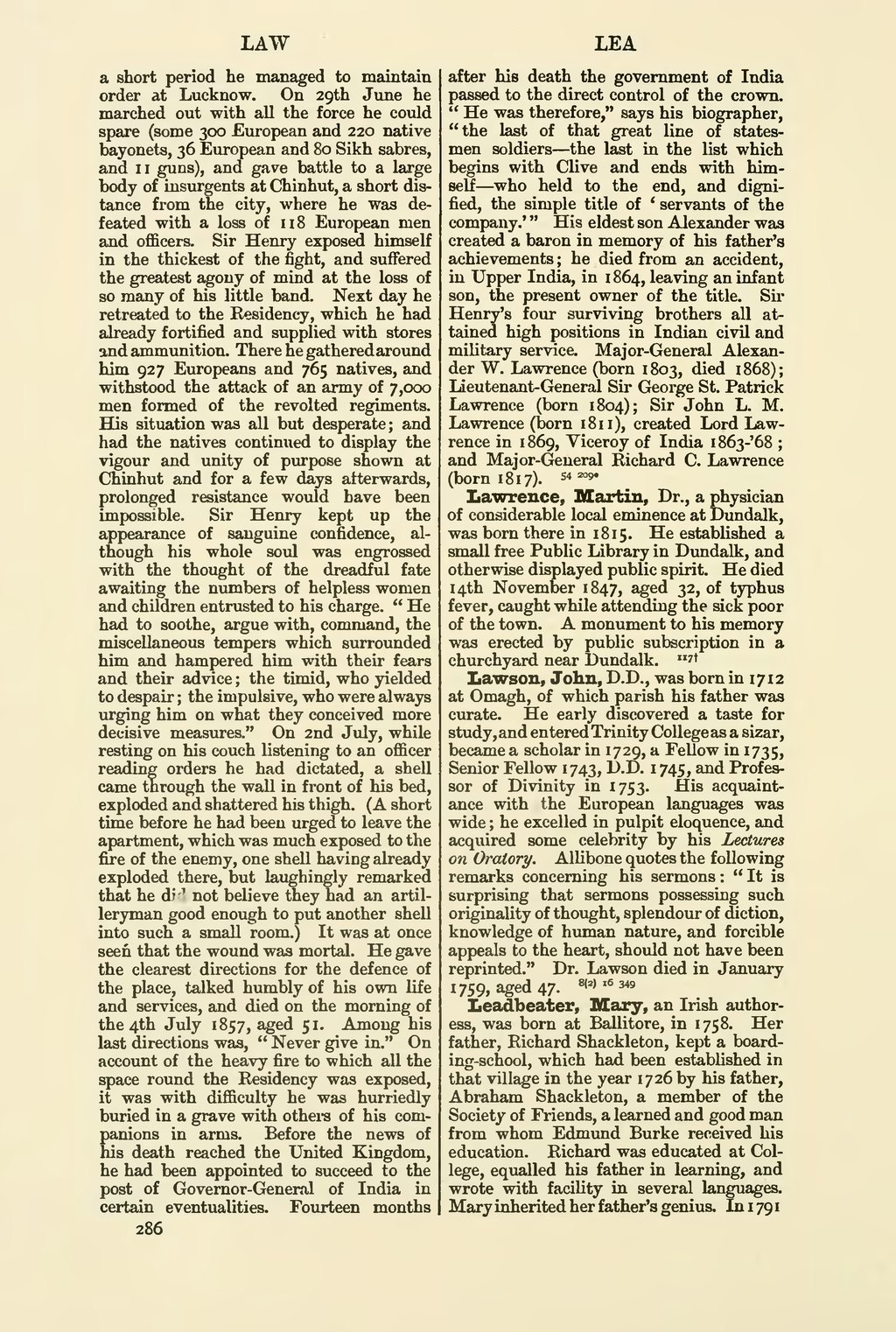a short period he managed to maintain order at Lucknow. On 29th June he marched out with all the force he could spare (some 300 European and 220 native bayonets, 36 European and 80 Sikh sabres, and 11 guns), and gave battle to a large body of insurgents at Chinhut, a short distance from the city, where he was defeated with a loss of 118 European men and officers. Sir Henry exposed himself in the thickest of the fight, and suffered the greatest agony of mind at the loss of so many of his little band. Next day he retreated to the Residency, which he had already fortified and supplied with stores and ammunition. There he gathered around him 927 Europeans and 765 natives, and withstood the attack of an army of 7,000 men formed of the revolted regiments. His situation was all but desperate; and had the natives continued to display the vigour and unity of purpose shown at Chinhut and for a few days afterwards, prolonged resistance would have been impossible. Sir Henry kept up the appearance of sanguine confidence, although his whole soul was engrossed with the thought of the dreadful fate awaiting the numbers of helpless women and children entrusted to his charge. "He had to soothe, argue with, command, the miscellaneous tempers which surrounded him and hampered him with their fears and their advice; the timid, who yielded to despair; the impulsive, who were always urging him on what they conceived more decisive measures." On 2nd July, while resting on his couch listening to an officer reading orders he had dictated, a shell came through the wall in front of his bed, exploded and shattered his thigh. (A short time before he had been urged to leave the apartment, which was much exposed to the fire of the enemy, one shell having already exploded there, but laughingly remarked that he did not believe they had an artilleryman good enough to put another shell into such a small room.) It was at once seen that the wound was mortal. He gave the clearest directions for the defence of the place, talked humbly of his own life and services, and died on the morning of the 4th July 1857, aged 51. Among his last directions was, "Never give in." On account of the heavy fire to which all the space round the Residency was exposed, it was with difficulty he was hurriedly buried in a grave with others of his companions in arms. Before the news of his death reached the United Kingdom, he had been appointed to succeed to the post of Governor-General of India in certain eventualities. Fourteen months after his death the government of India passed to the direct control of the crown. "He was therefore," says his biographer, "the last of that great line of statesmen soldiers — the last in the list which begins with Clive and ends with himself — who held to the end, and dignified, the simple title of 'servants of the company.' " His eldest son Alexander was created a baron in memory of his father's achievements; he died from an accident, in Upper India, in 1864, leaving an infant son, the present owner of the title. Sir Henry's four surviving brothers all attained high positions in Indian civil and military service. Major-General Alexander W. Lawrence (born 1803, died 1868); Lieutenant-General Sir George St. Patrick Lawrence (born 1804); Sir John L. M. Lawrence (born 1811), created Lord Lawrence in 1869, Viceroy of India i863-'68; and Major-General Richard C. Lawrence (born 1817). 54 209*
Lawrence, Martin, Dr., a physician of considerable local eminence at Dundalk, was born there in 1815. He established a small free Public Library in Dundalk, and otherwise displayed public spirit. He died 14th November 1847, aged 32, of typhus fever, caught while attending the sick poor of the town. A monument to his memory was erected by public subscription in a churchyard near Dundalk. 117†
Lawson, John, D.D., was born in 1712 at Omagh, of which parish his father was curate. He early discovered a taste for study, and entered Trinity College as a sizar, became a scholar in 1729, a Fellow in 1735, Senior Fellow 1743, D.D. 1745, and Professor of Divinity in 1753. His acquaintance with the European languages was wide; he excelled in pulpit eloquence, and acquired some celebrity by his Lectures on Oratory. Allibone quotes the following remarks concerning his sermons: "It is surprising that sermons possessing such originality of thought, splendour of diction, knowledge of human nature, and forcible appeals to the heart, should not have been reprinted." Dr. Lawson died in January 1759, aged 47. 8(2) 16 349
Leadbeater, Mary, an Irish authoress, was born at Ballitore, in 1758. Her father, Richard Shackleton, kept a boarding-school, which had been established in that village in the year 1726 by his father, Abraham Shackleton, a member of the Society of Friends, a learned and good man from whom Edmund Burke received his education. Richard was educated at College, equalled his father in learning, and wrote with facility in several languages. Mary inherited her father's genius. In 1791
